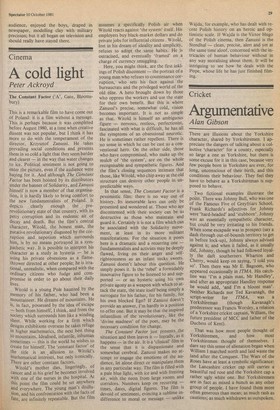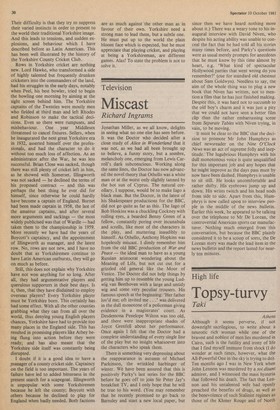Cricket
Argumentative
Alan Gibson
There are illusions about the Yorkshire character, shared by Yorkshiremen. I appreciate the dangers of talking about a collective 'character' for a county, especially so large a one as Yorkshire, but there is some excuse for it in this case, because very few people born in Yorkshire are ever, for long, unconscious of their birth, and this conditions their behaviour. They feel they have to behave as a Yorkshireman is supposed to behave.
Two fictional examples illustrate the point. There was Johnny Bull, who was one of the Famous Five of Greyfriars School. Frank Richards's adjectives for Johnny were 'hard-headed' and 'stubborn'. Johnny was an essentially sympathetic character, but could be very irritating to his friends. When some escapade was in prospect (say a dash through out-of-bounds territory to get in before lock-up), Johnny always advised against it; and when it failed, as it usually did, Johnny, though he had followed loyally the daft southerners Wharton and Cherry, would keep on saying, 'I told you so'. Then there was Mr E. Bagoom, who appeared occasionally in ITMA. His catchline was 'I'm a plain man, Mr Handley', and after an appropriate Handley response he would add, 'and I'm a bloont man'. Neither Richards nor Ted Kavanagh, the script-writer for ITMA, was a
Yorkshireman (though Kavanagh' s predecessor was Francis Worsley, a relation of a Yorkshire cricket captain, William, the future president of MCC and father of the Duchess of Kent).
That was how most people thought of Yorkshiremen, and how most Yorkshiremen thought of themselves. I dare say this sense of alienation began when William I marched north and laid waste the land after the Conquest. The Wars of the Roses have at least a symbolic significance: the Lancashire cricket cap still carries a beautiful red rose and the Yorkshire cap a rather ugly white one. But Yorkshiremen are in fact as mixed a bunch as any other group of people. I have found them more often generous than mean; as much rash as cautious; as much withdrawn as outspoken. Their difficulty is that they try to suppress their varied instincts in order to present to the world their traditional Yorkshire image. And this leads to tensions, and sudden explosions, and behaviour which I have described before as Latin American. This has been well illustrated by the history of the Yorkshire County Cricket Club.
Rows in Yorkshire cricket are nothing new. Lord Hawke, who transformed a side of highly talented but frequently drunken cricketers into the commanders of the land, had his struggles in the early days, notably when Peel, his best bowler, tried to begin the bowling one morning by aiming at the sight screen behind him. The Yorkshire captains of the Twenties were mostly men who fielded at third man and left Rhodes and Robinson to make the tactical decisions. Even so there were rumpuses, and misbehaviour. One year Middlesex threatened to cancel fixtures. Sellers, when he inaugurated the next great Yorkshire era in 1932, asserted himself over the professionals, and had the character to do it without too much loss of affection. As an administrator after the War, he was less successful. Brian Close was sacked, though there was still plenty of cricket left in him, as he showed with Somerset. Illingworth was not sacked — he declined the terms of his proposed contract — and this was perhaps the best thing he ever did for himself, since otherwise he could hardly have become a captain of England. Burnet had been made captain in 1958, the last of the amateur captains, and after several more arguments and sackings — the most widely publicised was that of Wardle — had taken them to the championship in 1959. More recently we have had the years of Boycott's captaincy, and the appointment of Illingworth as manager, and the latest row. No, rows are not new, and I have no doubt that as Yorkshiremen continue to have Latin American outbursts, they will go on much as before.
Still, this does not explain why Yorkshire have not won anything for so long. After all, they had argumentative players and querulous supporters in their best days. Is it, then, that they have disdained to employ overseas players? Every Yorkshire player must be Yorkshire born. This certainly has had some effect. With all the other counties grabbing what they can from all over the world, thus denying young English players chances, Yorkshire have had to provide too many places in the England side. This has resulted in promising players like Athey being flung into action before they were ready; and has also meant that the Yorkshire side itself was constantly being disrupted.
I doubt if it is a good idea to have a manager of a county cricket side. Captaincy on the field is too important. The years of failure have led to added bitterness in the present search for a scapegoat. Illingworth is unpopular with some Yorkshiremen because he left the county; Boycott with others because he declined to play for England when badly needed. Both factions are as much against the other man as in favour of their own. Yorkshire need a strong man to lead them, but a subtle one. He must put up to the world the plain bloont face which is expected, but he must appreciate that playing cricket, and playing at being a Yorkshireman, are different games. Alas! To state the problem is not to solve it.







































 Previous page
Previous page